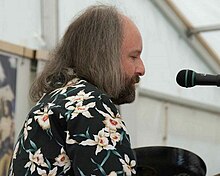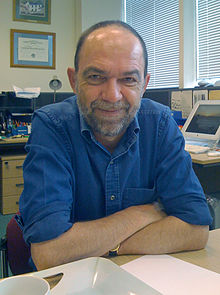Luton Sixth Form College
This article has multiple issues. Please help improve it or discuss these issues on the talk page. (Learn how and when to remove these messages)
|
| Luton Sixth Form College | |
|---|---|
| Address | |
 | |
Bradgers Hill Road , , LU2 7EW | |
| Coordinates | 51°54′08″N 0°24′51″W / 51.9023°N 0.4142°W |
| Information | |
| Type | Sixth form college |
| Established | 1966 |
| Department for Education URN | 130600 Tables |
| Ofsted | Reports |
| Principal | Altaf Hussain |
| Gender | Both male and female |
| Age | 16 to 19 |
| Former name | Luton Grammar School |
| Website | www |
Luton Sixth Form College is a sixth form college situated in Luton, Bedfordshire.
Admissions
It is noted for its multiethnic population; 69% of the College's students are from minority ethnic groups.[1][2]
History
In 1904 Luton Council acquired the Modern School, which was a mixed-sex secondary school. This school moved into new buildings in Park Square in 1908 (now the site of the University of Bedfordshire). By 1919 the school had grown significantly and further expansion was needed. A new building was constructed at Alexandra Avenue for the girls (now the site of Denbigh High School). This school was named Luton High School for Girls; the boys continued at the old site in Park Square.
Grammar school
Again expansion meant that a new building was needed and, in 1938, the current college was built on the north side of Bradgers Hill Road as the new site for Luton Modern School. At that time, the school was on the northern edge of the developed area of Luton, with open countryside beyond. In 1944 the school became Luton Grammar School. A mixed-sex technical college remained at Park Square until it moved to Barnfield Avenue in the 1950s, as Luton Technical Grammar School, but it was often referred to as Luton Secondary Technical School or the Tech. The site is now home to Barnfield College.
On 16 February 1965, a radio programme recorded at the school, Sporting Chance, was broadcast on the BBC Light Programme, where a team from the school faced Maurice Edelston, Peter West and Alan Clarke (sports commentator), with the quiz hosted by John Snagge.[3]
Sixth Form College

In 1966 Luton Grammar School became the first Sixth Form College in the UK, drawing together the Sixth Forms from the three selective schools in Luton. Many of the staff from the previous sixth forms as well as the libraries moved to the Bradgers Hill Site.
The founding College Principal was Brian David Dance B.A. Oxon (formerly Headmaster Cirencester Grammar School) who oversaw the creation, amalgamation and development of the College from 1966 to 1973. In 2011 the Luton News wrote of Dance's contribution to the College, 'During his tenure at the college, it become a model of excellence for many other local education authorities, seeking as it did to offer the widest possible range of A level courses, in many combinations unavailable elsewhere'.
In 1971 the College participated in the BBC television version of Top of the Form inter schools quiz show. After three victories (against Oxted County, Merthyr and Weston-super-Mare Grammar Schools) the College reached the finals of the national competition against Kenilworth Grammar School (broadcast on 8 June 1971). In August and September 1971 the same College team (together with Oban and Kenilworth Schools) took part in the BBC TV/USA TV 'Trans World Top Team' competition against the United States (represented by teams from Baltimore, New Orleans and St. Pauls). Of the six teams participating the College was placed close second to winners Baltimore.
Rebuild
In early 2007, the college announced plans to completely rebuild the site from ground up. The new £56 million[4] college opened to students on 7 September 2010 on the site of the old college's playing fields. Currently, phase two of the rebuild is taking place which includes the demolition of the old buildings and the construction of a new car park, a cricket pitch, football pitches and a path from the entrance to the site to the new college in their place.[5]
College profile
Student numbers
In October 2006 the following breakdown of numbers was recorded:
| Programme | Students |
|---|---|
| International Baccalaurate Year 1 | 22 |
| International Baccalaurate Year 2 | 23 |
| Advanced level single award (year 1) | 590 |
| Advanced level single award (year 2) | 590 |
| Advanced level double award (year 1) | 268 |
| Advanced level double award (year 2) | 179 |
| Intermediate level | 200 |
| Foundation level | 23 |
| Art Diploma | 10 |
| Total | 1905 |
As of 2010 the official student number, between the ages of 16–18, is 2197.[6]
Academic performance
Office for Standards in Education Report
The Office for Standards in Education deemed the following to be the strengths and weaknesses of Luton Sixth Form College (quoting directly):
- Key strengths
- outstanding leadership and management
- highly effective promotion of a multicultural ethos
- overall, students achieving GCE grades higher than those predicted by their GCSE results, achieved by predicting lower grades at the beginning of the year.
- fair standard of teaching and learning
- very good specialist resources
- thorough monitoring of student progress
- excellent advice and guidance
- excellent attendance and punctuality
- relatively safe and secure environment.
- What should be improved
- key skills provision
- effectiveness of group tutorials
- sharing of teaching skills and best practice between subject teams
- pass rates and the proportion of high grades achieved in some GCE AS and A-level subjects are significantly below the national average.
It gets A-levels slightly under the England average. There are only five places to take A-levels in Luton – the others are sixth forms at Cardinal Newman Catholic School, The Chalk Hills Academy, Stockwood Park Academy and Barnfield College.
Notable former pupils

- David Arnold, composer, musical curator of the London 2012 Olympics
- Carly Enstone, who played the Olympic Mum in the Frankie Says segment of the 2012 Summer Olympics opening ceremony
- Jaymi Hensley, member of Union J.
- Nadiya Hussain, winner of The Great British Bake Off
- Angus Knowles-Cutler, businessman
- Sarfraz Manzoor, journalist, broadcaster, and screenwriter of "Blinded by the Light"
- Kerry McCarthy, Labour MP since 2005 for Bristol East
- Gavin Shuker Labour MP since May 2010 for Luton South
- Conor Travers, the youngest Countdown champion winning at the age of 14 years[7]
- Steven West, Vice-Chancellor since 2008 of the University of the West of England
- Andrew Tate, Kickboxer, Big Brother contestant.
- Abdul Zaheer, Outstanding Intern, Network Rail(Career Ready) contestant.
Luton Grammar School
This article's list of alumni may not follow Wikipedia's verifiability policy. (October 2018) |


- Anthony Cave Brown, writer
- Laurie Brown, Bishop of Birmingham from 1969 to 1977
- Ivor Clemitson, Labour MP from 1974 to 1979 for Luton East
- Graham Collier OBE, jazz bandleader
- James Dyer, archaeologist, writer and author of the school centenary history Rhubarb and Custard (2004)
- Philip Eden, weather forecaster (last three years at the comprehensive)
- Stephen Evans,[8] who set up Renaissance Films
- Dennis Farr CBE, Director from 1980 to 1993 of the Courtauld Institute Galleries
- Prof Francis Goodyear, Hildred Carlile Professor of Latin from 1966 to 1983 at Bedford College, London
- John Gosling, keyboardist from 1969 to 1979 in The Kinks
- Alfred Hayes (wrestler)
- John Hegley, performance poet (briefly)
- Sir Colin Humphreys CBE, FRS FREng FIMMM FInstP, Goldsmiths' Professor of Materials Science from 1992 to 2008 at the University of Cambridge, and Director since 1994 of the Rolls-Royce University Technology Centre
- Sir Alec Jeffreys FRS, discoverer of DNA fingerprinting (last two years at the comprehensive)
- William Harry Manning FSA Emeritus Professor of Archaeology from 1983 to 2000 at Cardiff University
- Graham Miller (sports presenter), on the News at Ten in the 1990s
- Rear Adm Robin Musson CB, Chief of Naval Supply from 1991 to 1993
- Michael Peters (designer) OBE
- David Renwick, TV writer of One Foot in the Grave and Jonathan Creek (last four years at the comprehensive)
- Neil Shand, TV comedy writer
- Steven M. Smith, Professor of Plant Genetics and Biochemistry and 'High-End Foreign Expert’ of the People's Republic of China (last two years at the comprehensive)
- David Stephen, Director from 1983 to 1984 of the UK Immigrants Advisory Service (the Immigration Advisory Service from 1993 to 2011), and from 2002 to 2004 of European Movement UK
- Ian Thompson, 1974 Christchurch Commonwealth Games Champion (still holds the record time) and 1974 European Marathon Champion
- Des Turner, Labour MP from 1997 to 2010 for Brighton Kemptown
- Peter Rolfe Vaughan, Professor of Ground Engineering from 1987 to 1994 at Imperial College London
- David Webb (anti-censorship campaigner), actor
- Denis Wick, trombonist
- Dudley Wood CBE, Secretary of the RFU from 1986 to 1995, and President of Bedfordshire CCC from 1998 to 2006
Luton Modern School
- Herbert Barnell, Chief Scientific Adviser (Food) from 1959 to 1968 at the Ministry of Agriculture, Fisheries and Food
- Sir Frederick Mander, general secretary from 1931 to 1947 of the National Union of Teachers (NUT)
- Bernard Verdcourt, biologist
References
- ^ College profile Archived 27 January 2007 at the Wayback Machine
- ^ Leb Partnership. "Archived copy" (PDF). Archived from the original (PDF) on 25 April 2012. Retrieved 4 November 2011.
{{cite web}}: CS1 maint: archived copy as title (link) - ^ Sporting Chance
- ^ KSS Architects. http://www.kssgroup.com/projects/luton-sixth-college.php
- ^ Baqus Construction Consultancy. http://www.baqus.co.uk/case_studies/entry/redevelopment_of_luton_sixth_form_college
- ^ Department for Education. http://www.education.gov.uk/cgi-bin/performancetables/school_10.pl?Mode=Z&No=8218600&Type=LA&Begin=b&Num=821&Phase=2&Year=10&Base=a
- ^ "Conor crowned Countdown champ". 5 March 2013. Retrieved 26 April 2013.
- ^ Stephen Evans
